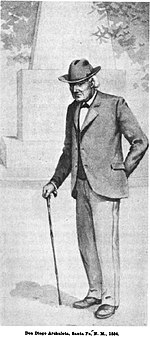Diego Archuleta
Archuleta was born in Plaza de Los Luceros, Rio Arriba, New Mexico, then a province of New Spain.
[1] His family were wealthy ranchers and, as such, they had the economic means to send him to Durango, Mexico where he received his primary and secondary education.
[2] His education was intended to prepare him for the priesthood, toward which he attained the four minor orders, but he decided not to follow that vocation before leaving Durango.
An account by Senator Thomas H. Benton states that at least twenty-four hours before Kearny reached Apache Canyon, James Magoffin had convinced (possibly with a bribe) Manuel Armijo to make no defense, but Colonel Archuleta, second in command, was determined to fight.
[1] Following the Capture of Santa Fe and the discovery that U.S. military orders were to take possession of the whole territory and that General Kearny was marching toward California, Archuleta was determined to revolt.
He organized the first conspiracy to overthrow General Sterling Price's government administration in Santa Fe, but the plot was discovered and stopped.
In 1861, Watts asked president Abraham Lincoln to replace Archuleta and to name Jose Antonio Mansinares to the position of Indian agent.
[13] When Archuleta was promoted to Brigadier General, he became the first Hispanic in history to reach that rank in the United States Military.
The following day he was assisted to his seat, cast his vote, and was then taken to his apartments, and although every known medical treatment was brought to bear, he died of heart failure.
On the day of the funeral native and American citizens alike assembled in vast numbers, performing the last honor to the distinguished statesman.
The 22d Infantry Band of the United States Army led the procession, which included the General commanding the District, Brigadier General David S. Stanley, his staff, and other officers of the U.S. Army stationed at Santa Fe, the members of the legislative assembly, the county commissioners, secret and patriotic societies.
His last speech in the House of Representatives was in favor of an amendment to a pending educational bill, which declared for non-sectarian administration of the schools of New Mexico.

